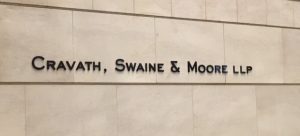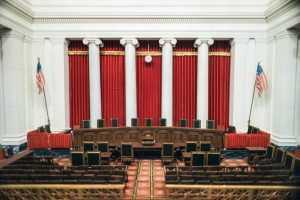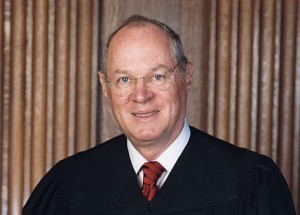Jean O’Grady
-
 Non-Sequiturs
Non-SequitursNon Sequiturs: 01.13.19
* A happy 200th birthday to Cravath, which celebrates its bicentennial in 2019 (and which has launched a sharp-looking, historically rich microsite for the occasion). [Cravath/200]
* According to Dayvon Love, “the policy response from mainstream political institutions and the Democratic Leadership in Maryland to the issue of gun violence and homicide in the Black community is mired in racism.” [Leaders of a Beautiful Struggle]
* The current Term of the Supreme Court doesn’t boast many blockbusters — but some cases are more interesting than others, as Adam Feldman points out. [Empirical SCOTUS]
* Illegal aliens, guns, and strict liability, oh my! Eugene Volokh breaks down Rehaif v. United States, which SCOTUS just agreed to hear. [Volokh Conspiracy / Reason]
* The Supreme Court has taken an increased interest in intellectual property in recent years — and if it wants to tackle issues of copyright infringement in the digital age, Capitol Records v. ReDigi could be a good vehicle. [All Rights Reserved]
* Speaking of supreme courts, Florida’s is likely to shift rightward, as Ed Whelan explains. [Bench Memos / National Review]
* If you’re getting lots of questions from friends and family about the constitutional law of shutdowns, check out this helpful explainer from Zachary Price. [Take Care]
* And if you have thoughts on what legal publishers got right and wrong in 2018, Jean O’Grady would like to hear from you. [Dewey B Strategic]
-
 Non-Sequiturs
Non-SequitursNon Sequiturs: 12.30.18
* In 2018, what did Donald Trump talk about when he talked about the courts? Adam Feldman dives into the data to find out. [Empirical SCOTUS]
* Speaking of President Trump and the judiciary, he continues to appoint federal judges at a record pace — but the Democrats are doing everything they can to slow down his progress. [Bench Memos / National Review]
* If you care at all about affordable housing, then you should be heartened by these developments in the fight against exclusionary zoning, as discussed by Ilya Somin. [Volokh Conspiracy / Reason]
* Congratulations to the Department of Justice on its ninth consecutive year of civil health care fraud settlements and judgments exceeding $2 billion. [MedCity News]
* If you’re interested in the hot topics among law librarians, legal technologists, and others in the space, check out Jean O’Grady’s most popular stories of 2018. [Dewey B Strategic]
* And if you’re interested in the year that was in artificial intelligence and the law, check out the Artificial Lawyer’s roundup of notable news. [Artificial Lawyer]
* Condolences to the friends, family, and colleagues of Bre Payton, who passed away last week at the age of 26. [The Federalist]
* Veteran trial lawyer David Berg continues his series on “What It Takes To Win.” [YouTube]
 Sponsored
SponsoredLegal AI: 3 Steps Law Firms Should Take Now
If 2023 introduced legal professionals to generative AI, then 2024 will be when law firms start adapting to utilize it. Things are moving fast, so…-
 Non-Sequiturs
Non-SequitursNon-Sequiturs: 10.07.18
* Should you go to law school? Our very own Kathryn Rubino lays out the pros and cons. [Policydb8] * You don't have to practice law; here's the story of how I went from practicing lawyer to founder of Above the Law, which I recently shared with Goli Kalkhoran. [Lessons From A Quitter] * UVA Law graduate Johnathan Perkins -- whose 3L controversy, covered in these pages (and elsewhere), turned out to be very different from initial reports -- has recommendations for improving the school's Honor System, especially when it comes to dealing with racial bias. [Cavalier Daily] * Eugene Volokh and David Post offering conflicting perspectives on Brett Kavanaugh and judicial temperament. [Reason / Volokh Conspiracy; Reason / Volokh Conspiracy] * The current Term of the U.S. Supreme Court might be short on blockbusters -- but it's not without interesting themes, according to Adam Feldman. [Empirical SCOTUS] * Emily Gold Waldman explores the intersection of diversity requirements, inclusion riders, and Title VII. [PrawfsBlawg] * Jean O'Grady looks at the latest offering from Intelligize. [Dewey B Strategic] * Funding continues to flow into the world of legal tech -- and the latest beneficiary is Lexoo, the U.K.-based, lawyer-matching online marketplace. [Artificial Lawyer]
-
 Non-Sequiturs
Non-SequitursNon-Sequiturs: 09.02.18
Ed. note: We will not be publishing on Monday, September 3, in observance of Labor Day.
* Law librarian Jean O’Grady rounds up the many books written by or about the late Senator John McCain — and extends her “condolences to his families and friends on the passing of a remarkable man.” [Dewey B Strategic]
* Getting Judge Brett Kavanaugh on the Supreme Court will become easier if Senator McCain’s successor is appointed before the confirmation vote — but as Adam Feldman explains, Judge Kavanaugh’s path to SCOTUS already looks quite clear. [Empirical SCOTUS]
* And here’s more good news for Judge Kavanaugh: the American Bar Association just unanimously rated him “Well Qualified” for the Supreme Court, as Ed Whelan reports. [Bench Memos / National Review]
* Would a Justice Kavanaugh come out in favor of the new Law Clerk Hiring Plan? As Will Baude notes, there does some to be an ideological aspect to this, with liberals more pro-Plan than conservatives. [Volokh Conspiracy / Reason]
* Law prof Ann Althouse calls out the Washington Post for going after the Trump Administration regarding a policy that was in place under Presidents Obama and Bush as well. [Althouse]
https://althouse.blogspot.com/2018/08/wapo-is-so-full-of-anti-trump-headlines.html* If you’ll be spending Labor Day at the beach, is it okay to take your top off? Here’s some guidance. [Seinfeld Law]
* Joel Cohen acknowledges that Michael Cohen (no relation) has some incentive to tell prosecutors what they want to hear, but cautions that “we shouldn’t take this all too far.” [Law & Crime]
* Shawn Gaines of Relativity outlines the ediscovery company’s ambitious plan to create a “legal tech app store.” [Artificial Lawyer]
-
 Non-Sequiturs
Non-SequitursNon-Sequiturs: 08.19.18
* Charles Glasser proposes replacing “Trump Derangement Syndrome” with “Trump Obsession Syndrome” — which might be more accurate, but isn’t nearly as fun. [Daily Caller]
* Speaking of anti-Trump sentiment, here’s an interesting new ranking — from Adam Bonica, Adam Chilton, Kyle Rozema, and Maya Sen — showing just how liberal certain law schools are. [TaxProf Blog]
* Trying to date in law school? You’re looking for love in all the wrong places, according to 3L Korey Johnson. [Black Girl Does Grad School]
* Speaking of law school, here’s Kat Griffin’s roundup of the best blogs for women law students (with a shoutout to ATL; thanks, Kat!). [Corporette]
* An “Abolish ICE” t-shirt might not be very fashionable — but it is constitutionally protected speech, as Eugene Volokh explains. [Volokh Conspiracy / Reason]
* Joel Cohen wonders: should more states ban secret recording of conversations — and could the odious Omarosa be the catalyst for such change? [The Hill]
* Neha Sampat discusses the problem of “imposter syndrome” — and what we can all do to address it. [Attorney At Work]
* “Sex pigs halt traffic after laser attack on Pokémon teens.” Yeah, you know you wanna click…. [Instapundit]
* Where does your law firm fall along the AI adoption spectrum? Jean O’Grady lays out the stages. [Dewey B Strategic]
-
 Non-Sequiturs
Non-SequitursNon-Sequiturs: 07.15.18
* What’s it like to take the California bar exam as a 46-year-old law professor? Orin Kerr enlightens us. [Reason / Volokh Conspiracy]
* Charles Glasser points out the dangers involved in holding a speaker responsible for actions taken by listeners. [Daily Caller]
* In the Term that just ended, the Supreme Court tackled technology issues in a big way — and the implications are far-reaching, as J.P. Schnapper-Casteras explains. [Take Care]
* Elizabeth Slattery and I joined Laurence Colletti, guest host of the Lawyer 2 Lawyer podcast, to discuss Justice Anthony M. Kennedy’s SCOTUS retirement and the nomination of his successor, Judge Brett Kavanaugh. [Legal Talk Network]
* There has been a lot of speculation about how a Justice Brett Kavanaugh might move the Court to the right; Adam Feldman digs into the cases to make some educated guesses. [Empirical SCOTUS]
* What lessons could losing the Court teach the Democrats? Here are some thoughts from Seth Lipsky and David Leonhardt. [New York Post via Instapundit]
* And what lessons can lawyers learn from Judge Kavanaugh’s excellent writing? Ross Guberman identifies five of them. [Legal Writing Pro]
* Joel Cohen and Dale Degenshein explore what happens when a citizen “flips the bird” at the police (hint: it’s not a good idea). [Law and Crime]
* Congratulations to Thomson Reuters on the launch of Westlaw Edge, the latest version of its industry-leading legal research platform — which boasts a slew of new, artificial-intelligence-driven features, helpfully explained by Jean O’Grady. [Dewey B Strategic]
* And speaking of AI, congratulations to Fenwick & West on cutting the time for contract review in half, with the help of technology from Kira Systems. [Artificial Lawyer]
-
 Non-Sequiturs
Non-SequitursNon-Sequiturs: 06.24.18
* It’s checkout time at the Supreme Court, and courtroom correspondent Mark Walsh is ready to reveal what’s in his shopping cart. [SCOTUSblog]
* Being cited by the Supreme Court is usually something to boast about — but not always, as Adam Feldman notes in this thoughtful analysis of how much oral arguments matter. [Empirical SCOTUS]
* Will Baude breaks down the Court’s intriguing debate over stare decisis in South Dakota v. Wayfair. [PrawfsBlawg]
* Joel Cohen looks at why the federal judiciary gets better treatment from the press than the other two branches of government — and whether the differential is justified. [The Hill]
* Orin Kerr identifies an interesting issue: if a police officer uses Google Translate to try and request consent to search from a non-English speaker in that person’s own language, is the consent valid if Google Translate botched the translation? [Volokh Conspiracy / Reason]
* There’s a long and bipartisan tradition of… the federal government spying on reporters, as Charles Glasser explains. [Daily Caller]
* Speaking of the media, Jean O’Grady points out a helpful new resource from CQ for consumers of news, along with tips for how to tell whether or not a story is “fake news.” [Dewey B Strategic]
* If reforms come to university boardrooms, let’s hope they include law schools as well. [ProfessorBainbridge via Instapundit]
* An interesting new use of voice-activated technology, courtesy of Wolters Kluwer: getting insights into federal tax law. [Artificial Lawyer]
* If you’ll be in New York on Tuesday, July 17, raise your glass with fellow young lawyers, summer associates, and law students, at the UJA’s Summer Law Happy Hour. [UJA Federation of New York]
-
 Libraries / Librarians
Libraries / LibrariansThe Law Librarians Revolt: AALL Accuses LexisNexis Of Engaging In Unfair Business Practices – Possible Antitrust Violations
The American Association of Law Libraries sent a 'cease and desist' letter to Lexis Nexis objecting to the bundling of unrelated products.  Sponsored
SponsoredIs The Future Of Law Distributed? Lessons From The Tech Adoption Curve
The rise of remote work has dramatically reshaped the relationship between Lawyers and Law Firms, see how Scale LLP has taken the steps to get…-
 Non-Sequiturs
Non-SequitursNon-Sequiturs: 05.27.18
Ed. note: We will not be publishing on Monday, May 28, in observance of Memorial Day. We will return to our regular publication schedule on Tuesday, May 29.
* What is up with the lively Twitter feed of George T. Conway, former Wachtell Lipton partner and husband of top Trump adviser Kellyanne Conway? It’s not entirely clear — but if you’re not already following GTC, you should be. [Politico]
* Because Masterpiece Cakeshop isn’t the only cake controversy out there: mom tries to get “summa cum laude” written on her son’s graduation cake, hilarity sues. [Althouse]
* Over at the invaluable Take Care blog, you can now find an extensive database of articles addressing impeachment in the Age of Trump — to complement Laurence Tribe and Joshua Matz’s new book about impeachment (affiliate link). [Take Care]
* Is Justice Anthony M. Kennedy about to retire from the Supreme Court? Per Adam Feldman, “signs point to Justice Kennedy remaining on the Court past this term notwithstanding all of the discussion surrounding his retirement.” [Empirical SCOTUS]
* When #MeToo meets defamation claims: a court tosses Tavis Smiley’s libel claim against PBS. [Volokh Conspiracy / Reason]
* “Surprise! Your expert witness has a rap sheet.” And there’s no plug-and-play solution to vetting expert witnesses, as Jean O’Grady explains. [Dewey B Strategic]
* Saira Rao, who helped diversify the world of children’s books, hopes to do the same for politics — by becoming Colorado’s first woman of color elected to Congress. [Teen Vogue]
-
 Non-Sequiturs
Non-SequitursNon-Sequiturs: 05.20.18
* After issuing a TRO to a block a political ad attacking his own allies and campaign donors — “almost certainly an unconstitutional prior restraint,” in the words of First Amendment guru Eugene Volokh — Judge Doug Martin of Arkansas (finally) recuses himself. [Daily Caller]
* Jim Comey’s bestselling book (affiliate link) could cause complications for Robert Mueller and his investigation, according to Joel Cohen. [Law and Crime]
* Which state solicitors general appear most frequently before the Supreme Court? Not surprisingly, Scott Keller of Texas leads the pack, but check out Adam Feldman’s list for other notable names. [Empirical SCOTUS]
* Jean O’Grady shares my admiration for the late Tom Wolfe — and even corresponded with the acclaimed author. [Dewey B Strategic]
* Too few people are willing to take ownership of change — and this is a big problem, as Greg Lambert explains. [3 Geeks and a Law Blog]
* John Fund asks: has the American Law Institute (ALI) strayed from its mission of describing the law and into advocating changes in the law instead? [National Review]
* What is “Old Tweet Syndrome,” and is there a cure for it? Charles Glasser makes a diagnosis. [Daily Caller]
* Adam J. White wonders: Does the Solicitor General’s request for more time to file its reply to Sierra Pacific’s cert petition in the “Moonlight Fire” case suggest that the Justice Department might confess error? [Weekly Standard]
* If you’ll be in Chicago on June 8, please consider coming to the twelfth annual dinner of the Richard Linn Inn of Court, where I’ll be speaking — hope to see you there! [Richard Linn American Inn of Court]
-
 Non-Sequiturs
Non-SequitursNon-Sequiturs: 02.25.18
* Audacious: former Mercer Law student Stephen McDaniel, who took apart the body of Lauren Giddings after brutally murdering her, seeks habeas corpus. [WGXA]
* “Did #MeToo really bring a reckoning to the legal industry?” A discussion featuring Katherine Ku, Dahlia Lithwick, Leah Litman, Ian Samuel, and me. [Vice]
* Speaking of #MeToo and the legal profession, look for more disturbing stories like this one to emerge in the weeks ahead. [Medium]
* Best friends: which amici in the Supreme Court have the strongest track records in major cases? [Empirical SCOTUS]
* Speaking of SCOTUS, if you were a billionaire who dropped $32.5 million on beachfront property, you too would hire Paul Clement to seek certiorari in your takings case. [SFGate]
* As someone with a mild case of prosopagnosia (aka face-blindness), I totally agree with Eugene Volokh’s recommendations about nametags at conferences. [Volokh Conspiracy / Reason]
* Divorce lawyer and former Playboy model Corri Fetman, no stranger to our pages, is running for Cook County Circuit Court judge — and calling out her opponents for running body-shaming attack ads. [Chicago Reader]
* Here’s what the United States can — and can’t — learn from the small, happy, and fairly homogenous nation of Denmark (by Megan McArdle via Glenn Reynolds). [Instapundit]
* If you share my confusion about blockchain, here’s a recommendation: check out the new Integra Wallet, just released by legal-blockchain pioneer Integra Ledger. [Artificial Lawyer]
* Speaking of leveraging the power of blockchain, you simply must check out Casey Flaherty’s new Magic Money Machine™. [3 Geeks and a Law Blog]
* If you work a lot with expert witnesses, you might want to check out Courtroom Insight, for reasons explained by Jean O’Grady. [Dewey B Strategic]
* Congratulations to Professor Jennifer Levi, recipient of the ABA Stonewall Award for her pioneering work on transgender rights! [Western New England University]
-
 Conferences / Symposia, Technology
Conferences / Symposia, TechnologyLegal Technology And Innovation: Ediscovery, Machine Learning, And Transactional Practice, Oh My!
When it comes to legal technology, there's a whole lot of innovation going on. -
Biglaw, Conferences / Symposia, Contempt, Dewey & LeBoeuf, Lateral Moves, Non-Sequiturs, Partner Issues, Television, Theater, Videos
Non-Sequiturs: 03.24.14
* Congratulations to WilmerHale on landing former FBI director Robert Mueller, and congratulations to Mueller on his move (a homecoming of sorts; he was once a partner at Hale & Dorr, the “Hale” in “WilmerHale”). [DealBook / New York Times] * A former television judge gets held in real-life contempt. [Memphis Commercial Appeal] * In the wake of the Dewey & LeBoeuf criminal charges, Jean O’Grady poses an interesting question: should law firms have whistleblower programs? [Dewey B Strategic] * “Have a Better Legal Career by Being Less of a Lawyer.” [Medium] * This story of losing a client might contain lessons for lawyers. [BigLawRebel] * As we previously mentioned, the SCOTUS-themed play Arguendo is coming to D.C., and there’s a discount code for ATL readers: WMATL, good for 15% off on previews, Friday nights, Saturday matinees, and Sunday evenings. Enjoy! [Woolly Mammoth] * In case you missed our Attorney@Blog conference, our friends at wireLawyer were on hand to document the proceedings. Video after the jump…. Thanks again to wireLawyer, for this great video and for hosting the post-conference cocktail party:
Sponsored

Early Adopters Of Legal AI Gaining Competitive Edge In Marketplace

The Business Case For AI At Your Law Firm


Legal AI: 3 Steps Law Firms Should Take Now
Sponsored

Is The Future Of Law Distributed? Lessons From The Tech Adoption Curve
